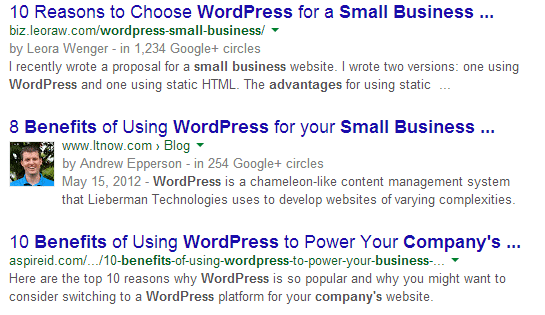Google Authorship: Saying Goodbye To The Feature
-

Aaron Gray
-
 April 27 , 2023
April 27 , 2023 -
 4 min read
4 min read
Around the same time with the HTTPS/SSL update, the search engine has stopped using the Google Authorship feature in the search results pages in 2014. The markup rolled out in 2011 and was a method for writers to verify ownership of the content they produced by linking the live pages to their Google+ profile.
What’s It For
On June 7, 2011, Google announced that the search engine was supporting the authorship markup, which allows writers to produce content outside of their website and connect these pages to author pages within their domain. The tag used were rel=”author” for HTML5 or rel=”me” for XFN to help search bots and other web services identify which pieces of content were written by the same author.

When the feature rolled out, Google coordinated with prominent websites such as The New York Times, Entertainment Weekly, and CNET to markup their pages. The team also added the tag for all content published through their platforms: YouTube and Blogger. Additionally, they confirmed that they were looking at how Google Authorship can boost the visibility of trustworthy authors and rank their pages high in the search results.
Over time, Google has tweaked the feature with image placements on the SERPs, the inclusion of the +1 button, circle count, and the “More By” author or related works link. There were also experiments on the types of snippets displayed along with the content like a video or review.
What Were Its Effects
Google Authorship met its ultimate demise because the developers deemed that it did not offer much value to users compared to the resources necessary for processing its data. The two primary reasons why the team stopped using this feature were low author adoption rates and low user value.
Here’s an in-depth look at the two reasons:
-
Low Author Adoption Rates Only a small portion of authors and webmasters used the feature for their content. Moreover, some who tried to implement the markup did it incorrectly. Meanwhile, others whose webmaster skills weren’t as advanced felt that the process was complicated and didn’t even attempt to link their content to their author pages.
Google did try to attribute authorship automatically to content that had no markup. However, this led to several issues; one of which was an author getting credited for a newly-published article years after his death. It was challenging for the developers to have non-Google people participate in the practice.
Low User Value Google’s John Mueller also announced that there wasn’t a significant difference between the click-through rates of content which had authorship credit and those that didn’t have the markup. This implied that users weren’t getting enough value from the snippets based on their browsing behavior. It could be that the searchers got used to the feature and were able to ignore it in subsequent queries.
What It Means for You
Google did continue using the markup for in-depth articles, but they also stopped implementing it in October 2015. Nonetheless, it’s still best to be consistent in tagging your content with your name and linking it to your website because of Author Rank.
Author Rank, which was coined by the SEO community, pertains to the possibility that Google may rank a piece of content high in the SERPs if it deems the creator as a reliable and credible source of information. Eric Schmidt, an executive of the company, has said in his 2013 book that web pages associated with verified online profiles will perform better in search results compared to those from unknown sources.
In Google’s Search Quality Rating Guidelines section 2.6, they mentioned that a website and content creator’s reputation can boost users’ understanding of what they’re known for and how well they can supply information that solves searchers’ queries. The team advised raters to give more weight to what other people are saying about a site and author instead of trusting their claims of authority and expertise.
While your reputation may not be a ranking factor per se, it does point toward Page Quality and how external sources deem your website’s credibility as an informative reference because of your authorship. The rater must evaluate how much you contribute or detract from the quality of your content based on Google’s rating on expertise, authority, and trustworthiness.
Therefore, your credibility as an author is crucial in your SEO efforts. It’s one of the reasons why you should only create high-quality content. This way, you establish yourself as a credible source of information as well as an expert in your niche or industry.

